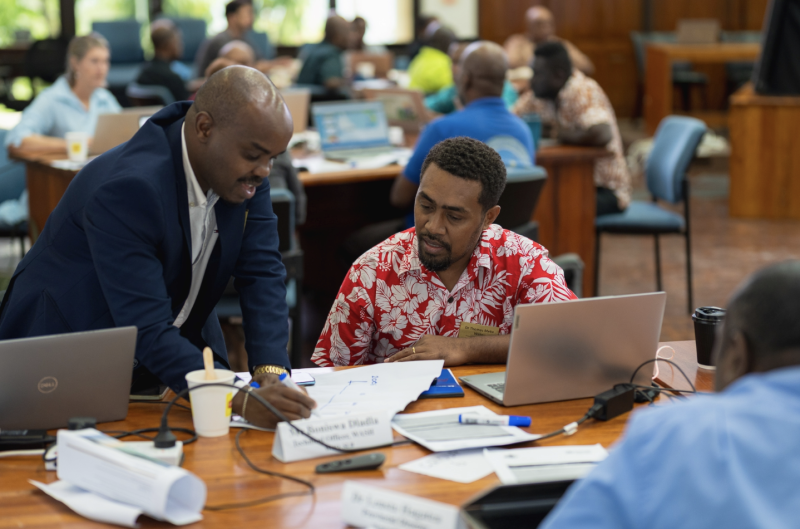
Solomon Islands enhances national emergency workforce capabilities with a multisectoral approach 24 April 2025 https://www.who.int/fiji/news/detail/24-04-2025-solomon-islands-enhances-national-emergency-workforce-capabilities-with-a-multisectoral-approa
Health workforce, Multisectoral
Western Pacific Region
Solomon Islands
The Solomon Islands Government, in partnership with WHO, completed a risk profiling and emergency workforce mapping exercise from 14 – 17 April 2025. Representatives across ministries, institutions, civil society, and other sectors collaborated to identify potential hazards and mitigate risks. As a result of the exercise, participants were able to assess workforce readiness and identify areas for strengthening capacities.
The exercise builds on recommendations from Solomon Islands’ first Joint External Evaluation in 2024 that highlighted the need for strengthening workforce capacities. The evaluation recognized that Pacific island countries and areas, like Solomon Islands, are increasingly impacted by the ‘double punch’ of climate-change related extreme weather events and subsequent disease outbreaks — and need to prepare their emergency workforce accordingly.
According to the World Bank Solomon Islands Country Profile, the country is warming and expected to continue to experience warming trends throughout the 21st century. The report added that Solomon Islands has significant vulnerability to extreme rainfall events and in the context of uncertainty, disaster risk reduction is of critical importance. Moreover, sea levels are rising faster than the global average. Submergence of the lowest-lying islands has already begun and threatens coastal communities.
Emphasizing the importance of strengthening emergency workforce capacities, Dr Nemia Bainivalu, Deputy Secretary for Health Improvement, Ministry of Health and Medical Services of Solomon Islands, noted: “The STAR workshop is hugely important in terms of in the setting and the context that the Solomon Islands is in, particularly for our health sector. This is in terms of where resources are somewhat challenging when we in the Solomons, have a geographical setting in that we are an island nation which provides logistical, financial, human resource capacity challenges. So I think this STAR workshop and having the stakeholders around the room is important and crucial when identifying where the impact of the use of our resources and our mandate to meet the demands of the community that we will serve.”
Leveraging diverse expertise to better prepare for multi-hazards
WHO’s strategic risk-based approach to emergency management reflects a shift in managing risks: moving away from single-agency planning—towards a more collaborative, multisectoral approach. Elaborating on this approach, Ms Monica Fong, on behalf of the WHO Representative in Solomon Islands, Dr Howard Sobel, said: “Emergencies are complex and require collaboration across different sectors. Through this workshop, WHO looks forward to fostering stronger coordination, cross-sectoral accountability and shared responsibility–which should ultimately translate into a more efficient emergency response.”
Through the exercise, Solomon Islands utilized evidence, collective experience, and expertise from multiple sectors to identify priority risks and map related emergency workforce capacities. Representatives from ministries of health, defense, environment, and finance, as well as the private sector, harnessed their diverse expertise to develop a comprehensive plan to address gaps and strengthen workforce capacities.
Strengthening emergency workforce capabilities
WHO’s strategic risk assessment (STAR) tool thus serves as a catalyst for strengthening emergency workforce capabilities. Through the workforce mapping exercise, representatives across sectors in Solomon Islands built consensus around priority hazards and actions to strengthen related emergency workforce capabilities. This workforce mapping will enable the country to identify resources to strategically strengthen national emergency workforce response capacities.
STAR fully complements the Asia Pacific Health Security Action Framework, which was endorsed by the Region’s Member States during the Seventy-fourth session of the Regional Committee for the Western Pacific. The Framework is designed to engage health and non-health actors to support prevention, preparedness, readiness and response to multi-hazard public health emergencies, and to strengthen the resilience of health security systems at subnational, national and regional levels.
The workforce mapping exercise is an example of how WHO’s Global Health Emergency Corps Initiative (GHEC) is being rolled out across countries in the Region. Through GHEC, WHO supports countries to strengthen, standardize and scale national health emergency workforce capacities.
WHO is grateful for contributions from Gates Foundation, Korea Disease Control and Prevention Agency, the Global Environment Facility, and the National Critical Care and Trauma Response Centre that made this work possible.